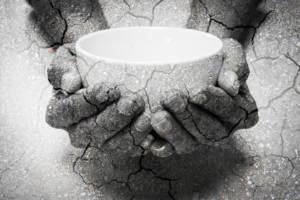 Like most organisms on our planet, humans need food and water to survive. We’d die without them within a matter of days, but people calling themselves “Breatharians” insist that they live only on oxygen and an invisible life force. New self-styled gurus continue to surface and promote this ideology. To understand how and why Breatharians invest in such a risky belief system, it’s worth taking a look at their controversial ideas.
Like most organisms on our planet, humans need food and water to survive. We’d die without them within a matter of days, but people calling themselves “Breatharians” insist that they live only on oxygen and an invisible life force. New self-styled gurus continue to surface and promote this ideology. To understand how and why Breatharians invest in such a risky belief system, it’s worth taking a look at their controversial ideas.
A Brief History of Breatharianism
Sometimes referred to as Inedia, Breatharianism’s basic premise is to survive only on air and the universe’s energy. Proponents believe that it is possible, if not ideal, to transition from consuming food and liquids to an existence free of these substances. The life force that’s supposed to sustain them takes on a variety of names, depending on who’s selling the concept. Most call it “prana,” the Sanskrit word for breath, but some use the Chinese term “chi.”
Just as the concept of religious fasting has older roots, anecdotes about spiritual masters subsisting on breath alone aren’t new. The 17th century Rosicrucian text “Comte de Gabalis” mentions Paracelsus, a Swiss occultist who asserts that he survived on “solar quintessence.” Prahlad Jani, an Indian mystic, confounded researchers in 2010 with statements that he didn’t need to eat or drink. GQ’s Breena Kerr lists more recent proponents, including Wiley Brooks, who appeared on the television show “That’s Incredible!” with similar claims. Later, an Australian woman calling herself Jasmuheen published the book “Living on Light” in which she promoted the same lifestyle. Tragically, five of her followers have died while attempting Breatharian practices.
A Resurgence of Popularity
Breatharianism would have remained in relative obscurity were it not for a series of sensationalist news articles in June 2017. As CNN’s Oliver Darcy reported, Californians Akahi Ricardo and Camila Castillo insisted they’d adhered to a mostly food-free regimen since 2008. The story was originally published by News Dog Media, a tabloid content agency based in the United Kingdom. It was eventually picked up by other outlets including Yahoo, The Daily Mail, and The Independent.
After the story gained notoriety, journalists and writers stepped up to debunk Breatharianism. Both Breena Keer and Patheos blogger David G. McAfee shared deep concerns about the health and safety of people attempting to go without food and water. Others pointed to a 1999 Australian television program in which Jasmuheen was housed in a hotel room and monitored 24 hours a day to confirm she didn’t consume food or water. This trial ended after four days because Jasmuheen exhibited slurred speech, dilated pupils, and 15 pounds of weight loss.
Yet despite the dangers, a small group of believers still try to undertake a Breatharian lifestyle. There are a few online communities such as Breatharianism Canada. Meanwhile, Ricardo and Castillo offer a “Breatharian challenge” course, which lasts eight days and is available for a regular price of $397. Wiley Brooks still operates the Breatharian Institute of America, and Jasmuheen continues to sell books and publish short instructional films on YouTube.
Some Skepticism Is Healthy
What accounts for such persistent faith in these deadly ideologies? Writing for Psychology Today Canada, Dr. Joe Pierre suggests an answer to this question. Improbable beliefs frequently possess a small grain of truth, such as limited fasting taken to extremes with Breatharianism. False claims can be dressed up with clever prose and spread widely online. Finally, confirmation bias can inhibit individuals from fact-checking content that supports their worldviews before accepting it as truth.
Forming beliefs and convictions is a natural human tendency. Balancing faith and reason is essential to this process. While ideas can lead to action, it’s important to make sure that we don’t cause harm to others or ourselves.


